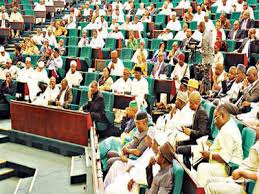The House of Representatives is reportedly making moves to consider a Bill that will empower the state governments to collect value added tax (VAT) by moving it to the Concurrent Legislative list.
A news report linked to SaharaReporters stated that bill titled “An Act to Alter 39 Part 1 of the Second Schedule of the 1999 Constitution as Amended to Substitute and Move the Item from the Exclusive Legislative List to the Concurrent Legislative List” was sponsored by two members of the Green Chamber, Hon. Hassan Usman Sokodabo and Hon. John Dyegh.
The bill read in part: “The Constitution of the Federal Republic of Nigeria, 1999, is hereby altered as set out. Item 39, part 1 of the Second Schedule of the Principal Act, Altered by substituting the item and moving it from the Exclusive Legislative List, to the Concurrent List.
“Thus, item 39, Part 1 of the Second Schedule of the Constitution to be moved to the Concurrent Legislative List now read: States Government shall manage their resources, mines and minerals, including oil fields, oil mining, Values Added Tax (VAT), geological surveys as well as natural gas. 50% of the total revenue accruable from the minerals shall be retained by the state where the minerals are derived.”
“30% shall be credited to the Distributable Pool Account, while the remaining 20%, shall be credited to the Federation Account.”
The legislative move is coming on the heels of legal tussle between the Federal Inland Revenue Service (FIRS) and the governments of Rivers and Lagos States over the collection of Value-Added Tax.
The two state governments and some others have joined forces with the Rivers State Government in challenging the constitutionality of the FIRS’ collection of VAT, after a High Court in Port Harcourt ruled in favour of Rivers State Government in the suit filed by it on the matter.
Meanwhile, Lagos State has since joined Rivers State in pursuing the legal option to resolve the matter while other states across the geo-political zones are divided in their positions over the matter before the courts.




